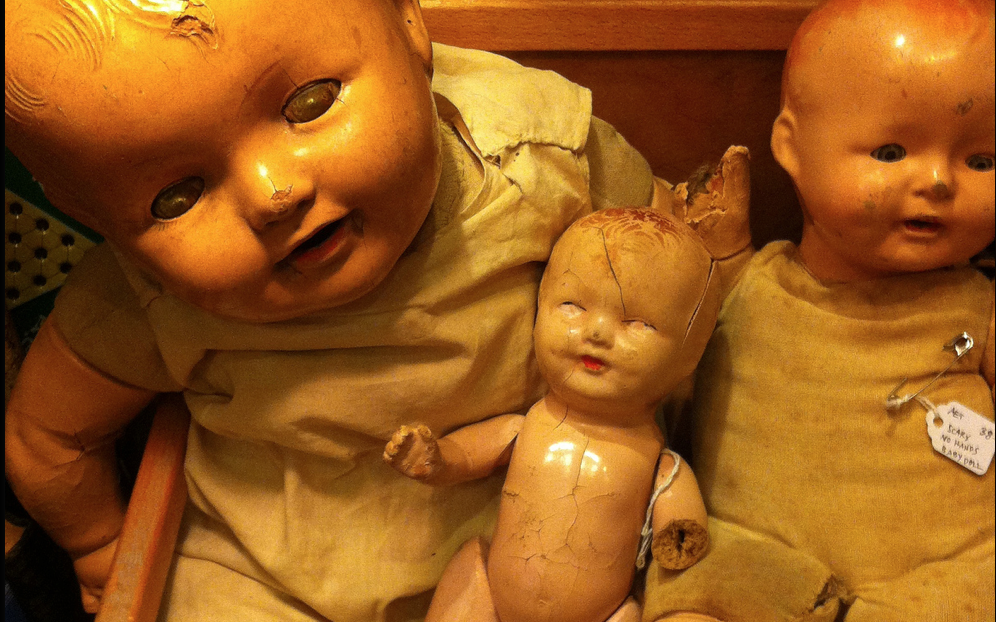AI: Here, There be -isms (Maybe)
Before we get to today’s Inquisition, I just thought I’d mention I’m going to be doing some work in Birmingham, Alabama next week (8/22Â thru 8/27), and I don’t really know anyone there. Any Birmingham skeptics out there? Hello? Anyone?Â
If so, perhaps a SitP or a dinner is in order?
Holla.
Okay, so . . .
Today I’m curious to find out what you all think about morality and the driving forces/factors behind what we term moral behavior. And I wanted to keep the questions vague in order to leave a lot of wiggle room for broad discussion, but even if they seem specific, keep in mind the boundaries here are as wide as you want them to be.
So strap in, and feel free to go off on whatever tangent the subject brings to mind.
What is morality? Where do morals come from? Is there a viable concrete system of ethics? Can there be a viable concrete system of ethics? Should there be a viable concrete system of ethics? Do you consciously conduct your life by a definable moral code?
The Afternoon Inquisition (or AI) is a question posed to you, the Skepchick community. Look for it to appear Tuesdays, Thursdays, Saturdays, and Sundays at 3pm ET.





Skeptics do exist in Bham. Check out this site :)
http://www.meetup.com/atheists-132/calendar/14019243/
Blue! Because it takes 12 pancakes to shingle a doghouse.
Hmm. I seem to have left my answers to vague morality questions in my other overalls. If you have extra time in B’Ham, however, I highly recommend the botanical gardens. They are some of the best I have ever been to.
Morality is a set of rules, usually agreed on by the group (society), that is used to guide day to day decision making.
Morals come from society and its norms, as told through all forms of art, religion, storytelling, and throught direct example. Some forms of morals transfer are more efficient, and less detrimental, than others.
Yes, I believe a system of ethics exists, but that it is always changing and is therefore NOT concrete, more like elastic. I believe there CAN be a concrete system, but that there should NOT be one. That is what is known as rigid dogma.
I conduct my life by a moral code. I would not, however, try to define it. I would cotradict myself, reason down blind logical allies, and go off on so many tangents as to sound like a lunatic.
I don’t, however, want anyone to think that I am a relativist, those people irritate me, usually. ;)
Morality comes from the nature of our being social animals. Morality can ultimately be explained as “how we get along in a group so that the group likes us and doesn’t eat us”.
All societies have had morality, but the exact details differ with culture and outside forces. Eating people would be considered immoral, but there were clearly cultures who felt they were entirely good people who ate others.
Morality in the individual is impacted by environment more than anything else. If you live in a culture where chewing coca leaves to get messed up and have fun is acceptable, then it’s perfectly moral because everyone does it. If you live in a culture of puritanicals, then that behavior would be immoral. It comes down to the individual and the group in question.
I don’t believe there is a constant system of ethics, but I do believe that all humans have certain ethics and morals that are common. I have not heard of a culture that believes killing your own family and the members of your immediate society is acceptable. Stealing from within the pack is unacceptable. Lying is generally frowned upon within the group setting. But rape is a fine example of how morality can be based on culture and custom. The idea of raping a woman sickens me, but there are millions of people the world over who believe that, so long as you are married, the woman has no say over it, and thus rape is perfectly understandable.
I live my life by my own moral code. I have hurt myself many times over doing what’s right instead of what’s easy. At the same time, I’ve screwed up lots too. Part of being human.
I definitely live my life by ethical principles, many of which were formed in my Jewish religious roots. I grew up with a heavy emphasis on tikkun olam (repairing the world). That covers everything from helping the sick to environmentalism to working on human rights issues. Of course, none of that has anything to do with an Almighty.
I did want to bring up in this context though, that I have been engaged in a fascinating online discussion with a bunch of Orthodox Jews on the issue of same sex marriage. I find the “logic” they use fascinating and I am absolutely learning about where their arguments lead them. Ultimately, it is a bit like Inigo Montoya – (I do not think it means what you think it means). When asked about “facts” and “science” they seem to think those terms are much more fluid than most of us. When I have tried to explain the definition of fact (I am sitting in a chair) vs. belief (this chair is the best chair ever), they seem to have a disconnect. I suppose prior to this, I thought we were at least all working with the same language, but it appears not.
@biguglyjim: “I have not heard of a culture that believes killing your own family and the members of your immediate society is acceptable.”
There are plenty, but they require justification. I think the starkest example is Muslim “honor” killings. This is killing of a family member, but it requires the very strange justification that a victim should die so she (or her family) is/are not dishonored by her continued life.
@hall of justice: You’re right, totally should have thought of that. But the point remains, these behaviors are considered taboo unless some weird mitigating circumstances are present.
@Zapski: Or as I was going to say it – “Five”.
I’m gonna be all dorky, and define my terms. ^_^
In the case of morality and ethics, I think the definitions are interesting. How someone defines the terms actually reveals a lot about how they think about these subjects.
Morality
A list of assertions regarding human behavior, where each statement can be structured in the form of something like ‘Thou shalt X’ or ‘Thou shalt not X’ (or, ‘It is morally good to do X’ or ‘It is morally bad to do Y’).
‘Morality’ in this sense is just the list of assertion. There are – potentially – and infinite number of such lists that we could generate.
Such lists could include anything. One list could say: Thou shalt not rape. Another might say the opposite: Thou shalt rape.
‘Morality’ is just a list of assertions. Determining whether that list should be taken seriously is the subject of ethics.
Ethics
Ethics is the body of discourse that negotiates how we should generate and maintain a morality. It also negotiates how we can evaluate, compare, and contrast competing moralities.
Is morality A better than morality B?
Is morality A the One True Morality?
Is there a One True Morality?
Morality A and B aren’t good enough; what would make a good morality C?
Asking and answering such questions is to pperform ethics.
Rhetoric
To me, ethics and morality are ultimately a question of persuasion and rhetoric. Yes, logic and reasoning and objective evidence can have a role to play, they’re central components of how I approach the subjects.
But not so for everyone.
Assume someone who’s morality contains one or more statements that is objectively harmful and demonstrably irrational, such as ‘Murder all blue-eyed baby boys when they turn two years old’.
Now also assume that this person is deaf to appeals to reason and evidence.
We cannot present this person with evidence relating to the the social and individual harms being caused as a direct result of their moral statements.
And we cannot appeal to this person’s reason with the unfairness and baseless nature of their moral assertions.
So what, then, do we do?
Giving up isn’t always an option. Hitting the person over the head with evidence and reason won’t work.
Education is often suggested – but people disinterested in reason and evidence are not typically well disposed to any form of ‘education’ that doesn’t cherish their pre-existing beliefs.
What’s left?
Well – either give up, or get cynical. Work out what that person does find persuasive, and hit those buttons.
Rhetoric is just a tool. It’s a tool that is often misused, to be sure. But like all tools, it can be used for the forces of good just as well as it can be used for evil. We shouldn’t shun it, or its important role in the arena of morality and ethics.
Reflection
Funny how my conception of morality, ethics, and the issues involved all seem to pretty much line up against my conceptions of skepticism, which in turn line up against my conceptions of atheism. Hmm… I’ve either got some mad consistency going on, or I’ve missed something glaringly obvious.
Thoughts, anyone?
I’m in Birmingham. There aren’t a lot of like-minded people here, but you can find some. My wife and I would be happy to do dinner one night while you’re here.
We can be pretty certain that morality does not come from religion. All we have to do is research the past history of the Abrahamic religions.
The 3 related sects…Islam, Christianity, Jews…are responsible for millions and millions of deaths since they were invented. If you realize that Christianity was a driving force behind the settling of the New World, the totals probably reach or exceed 100,000,000 innocent humans.
Of course in modern times the Muslims are killing thousands of people in the name of their religion. The Middle East is a scary place to be no matter what your religion.
Also in modern times the Jewish state of Israel is living up to their motto “Never Again” and they don’t take crap from anybody. I think their actions are guided more by secular motives than religious.
In short, there is no way morality in the world today is guided by God/Allah/Yahweh.
Living ethically is pretty simple. People try their best to be ethical along lines we all agree on and if they are wise or have especially good advice than they especially succeed.
Why we give a darn about the preservation of human life and the increasing of human happiness is explained evolutionary.
But why we should have the moral framework we do have is a trickier question. The best answers I think we can have is something like:
1) Well religion certainly doesn’t solve the problem, so going without it can’t hurt.
2) There is a qualitative and quantitative difference between an active living universe and one devoid of life.
3) We are self-aware, therefore capable of making a meaningful choice about morality.
4) If it is impossible to know, than there may still be good reason to try.
We are all such good people when you give us a chance. I’m not terribly interested in why we are such good people or how we know that we are, but I think there are satisfactory answers to these sorts of questions. In the meantime, bomb blasts go off and sickness takes the innocent and we’d all be damned fools not to try to do something about it.
I’ve found that morals aren’t very useful. I have mine, of course, but mine are different from yours which are again different from somebody else’s and so on.
If I wish to influence somebody to or away from some course of action, I’ve found that appealing to morals or ethics to be largely useless and go straight for enlightened self-interest instead.
@thewordofme
I think you are assuming that religious morality is concerned with preserving human life.
I think religious morality (that is quite the oxymoron) is concerned only with preserving the sect and “heaven” help anyone that gets in the way of that whether it is telling a different “truth”, depriving the sect of money, worshiping a different version of the invisible man, or some other blasphemous deed..
The only thing that puts a damper on this kind of self-preservation-at-all-costs thinking is a larger group that asserts their own morals over the sect.
Judeism and Christianity have, for the most part, been dragged kicking and screaming into the 19th century by societies that, because of their own enlightenment eras, realized the damage being done in the name of God. (we may have forgot some of these lessons)
There was a time when Islam was the intellectual light of the world, when they gave us medicine, math, astronomy, ect. until the sect saw that their numbers were shinking and lashed out in self-preservation.
They are currntly still in their “dark age” and if we (the more rational society) are not careful the Western world might be heading back to one of its own.
You are right that religion does not give us morals, it is just used as a disease vector.
Unlike apparently a lot of people here, I believe in an absolute morality — NOT one that’s culturally determined. For instance, the Aztecs believed in tossing babies into cenotes to bring rain, or flaying people to encourage spring. Many aspects of the culture (I won’t say the whole thing) were essentially immoral.
I don’t see why people have to bend themselves into pretzels to come up with a definition of morality. Mine is dead simple. There are two parts:
1) Imagine a better future.
2) Work to make it happen.
That’s it. By “better” I mean not necessarily just better for you or your descendents. Pick a random child born somewhere on the planet in the future. Will your action make the world better (more pleasant, more fulfilling) for THAT kid? If so, then it’s moral.
Where do morals come from?
They develop when we realize there are consequences to our actions. If you get caught mating with the female in the neighboring cave and her mate hits you with a club and your own mate throws rocks at you, you learn your society does not approve of adultery .
When you realize that working together you can bring down a mammoth and eat for a month, as opposed to catching a rabbit an eating for a couple days you realize that cooperation has advantages, and so forth…
@BruceGee1962: Yeah, that is simple alright. Way too simple. Not the two steps you outlined, which are pretty obvious, but the “test” you devised. I think you need to work on that part. There are too many very horrible acts that could pass that test and qualify as moral.
“Nothing is True, Everything is Permitted” –Hassan-i Sabbah
@BruceGee1962: But who gets to decide what “better” is? If Person A thinks a better future involves sacrificing one person to save the rest of my community, but Person B thinks that a better future involves living in a community where an innocent person would never be sacrificed no matter the cost — who decides which is the better action?
Morality is strictly relative. End of conversation.